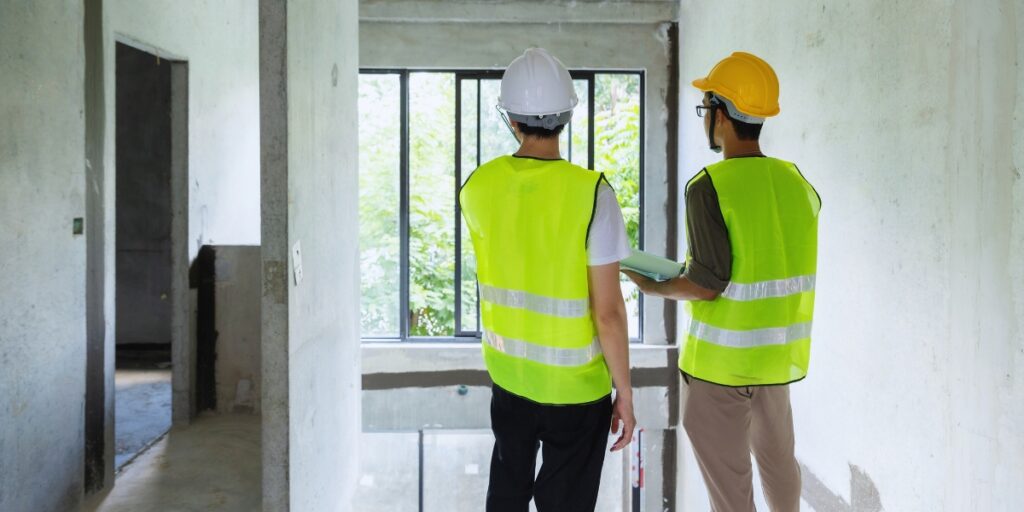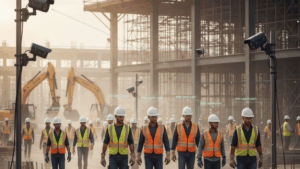Condominium management involves much more than financial management and mediation between residents. Property preservation, occupant safety, and the prevention of structural or legal problems all require periodic and specific technical assessments.
In this context, three procedures emerge that, although often confused, have different objectives: inspection, survey and expertise .
Understanding the difference between them is essential for building managers, administrators, and even condominium owners, as each one meets different demands and contexts, directly impacting the security and value of the property.
Why understanding these concepts is essential for condominiums
A condominium, whether residential or commercial, is a complex structure, with electrical, plumbing, fire-fighting systems, elevators, leisure areas, and other elements that must be fully operational. Without proper technical supervision, small problems can turn into major financial losses and risks to people's physical safety.
Legislation and technical standards require that certain procedures be carried out periodically or in specific situations, such as receiving work, major renovations or legal disputes.
Condominium Inspection
An inspection is a preventive procedure performed to assess the general condition of a condominium. It's not motivated by a specific problem, but rather by the need to verify the condition, safety, and functioning of the facilities and structures.
Purpose of inspection
The purpose of the inspection is to identify faults and wear before they compromise the condominium's functionality. It's a preventative analysis that allows for advance planning of maintenance, replacements, and repairs.
When inspection is required
- Periodically, in accordance with technical standards or municipal regulations, such as NBR 16747 – Building Inspection;
- Before the expiration of construction guarantees, to contact construction companies, if necessary;
- As part of a preventative maintenance program.
What is evaluated
During an inspection, the responsible engineer or architect analyzes aspects such as:
- Physical structure (facades, foundations, roofs);
- Electrical and hydraulic systems;
- Safety and fire-fighting equipment;
- Conservation of common areas.
At the end, a technical report is issued with observations and recommendations, which will serve as the basis for a maintenance plan.
Condominium Inspection
An inspection is a one-time procedure designed to record the condition of a property or condominium area at a given time. It's used to verify the physical condition of something, typically to prevent or resolve disputes.

Purpose of the inspection
The main objective is to objectively document the observed conditions through description and photographic records. This can be comparative, comparing the current state with the previously recorded state.
When an inspection is necessary
- Upon receipt of common areas after delivery of the work;
- Before and after renovations in units or common areas;
- In cases of apparent damage that needs to be documented for accountability;
- To prove compliance with contractual obligations.
What differentiates it from inspection
An inspection is more descriptive and less analytical than an inspection. It doesn't delve into the causes of problems, but rather documents the current state, serving as a record for future reference or administrative processes.
Condominium Expertise
An expert appraisal is a specialized technical procedure aimed at clarifying facts and providing informed conclusions for legal or arbitration proceedings. It is more detailed than an inspection or review and follows a formal procedure defined by law.
Purpose of the expertise
Expertise seeks to identify the causes, consequences, and technical responsibilities of a problem or event. It can be ordered by a judge, arbitrator, or requested by one of the parties as evidence.
When expertise is needed
- In legal disputes involving construction defects, leaks, noise or structural damage;
- In arbitrations between condominium and construction company or between condominium owners;
- To determine claims covered by insurance.
Who can perform
The expert assessment must be conducted by a qualified expert registered with the relevant professional association (CREA or CAU). In legal proceedings, the expert is appointed by the judge, and the parties may appoint technical assistants to monitor and present opinions.
Final result
The expert report is a technical and conclusive document that presents the methodology used, the data collected, the analyses, and the reasoned conclusion. It is used as technical evidence and carries significant weight in court decisions.
Differences in practice
While inspection, survey, and expert appraisal may seem similar to those outside the field, the differences become clear when we examine their objectives and practical applications. Inspection is comprehensive, preventive, and periodic, seeking to anticipate problems. Inspection is specific, descriptive, and corroborative. Expert appraisal is analytical and conclusive, with a rigorous methodology and legal validity.
In condominium management, these three tools complement each other. A condominium that conducts regular inspections reduces the need for expert assessments by anticipating problems. Inspections help document situations and protect the condominium from potential liabilities. Expert assessments are called upon when disputes or questions arise that require qualified technical clarification.
Comparison between inspection, survey and expertise
To better understand the differences, see a summary:
| Aspect | Inspection | Survey | Expertise |
| Purpose | Prevention and maintenance | Current status record | Technical clarification for court decision |
| Depth | General and preventive | Descriptive and punctual | Analytical and conclusive |
| Formality | Low to medium | Average | Discharge, following legal procedures |
| Final product | Inspection report | Inspection report or report | Expert report |
The importance of each procedure in condominium management
Heritage preservation
Inspections help extend the lifespan of equipment and structures, avoiding excessive spending on emergency repairs. Inspections document the condition and serve as evidence in disputes. Expert reports identify responsibilities and guide technically-based damage repairs.
Resident safety
Structural failures, compromised electrical installations, and ineffective firefighting systems pose real risks. Regular technical procedures help maintain up-to-date safety.
Property valuation
A well-maintained condominium with up-to-date technical records tends to appreciate in the market, increasing its attractiveness to new buyers or renters.
Legal compliance
In some municipalities, building inspections are mandatory. Furthermore, expert reports may be required in legal proceedings, and inspections are frequently requested in contracts and insurance policies.
How to choose the right professional for each procedure
Choosing the right professional is crucial. For inspections and surveys, it's recommended to hire engineers or architects with experience in property assessment and maintenance. For expert assessments, the professional must be registered as an expert and, in legal cases, be certified by the court.
When hiring, check:
- Registration with CREA or CAU;
- Proven experience in the type of service;
- References from previous works;
- Knowledge of applicable technical standards.
Applicable rules and legislation
Some of the most common rules in these procedures are:
- NBR 16747 – Building Inspection;
- NBR 13752 – Engineering Expertise in Civil Construction;
- NBR 15575 – Performance of Residential Buildings.
In addition to technical standards, municipal and state laws may establish mandatory requirements and deadlines for carrying out inspections and submitting reports.
Good practices for condominiums
Maintaining an organized history of inspections, surveys, and expert reports is essential. This includes keeping all reports and assessments, along with photos, floor plans, and technical responsibility notes (ART or RRT). This way, in case of doubts or disputes, the condominium will have robust documentation to support its actions.
Another good practice is to integrate these procedures into the condominium's annual planning, avoiding surprises and optimizing resources allocated to maintenance.
Investing in prevention is cheaper than correcting problems
Inspections, surveys, and expert appraisals are distinct but complementary tools in condominium management. While inspections are preventative, inspections document the current status, and expert appraisals conclusively clarify facts and responsibilities. When implemented correctly, these practices ensure greater security, preserve assets, and avoid legal disputes.




